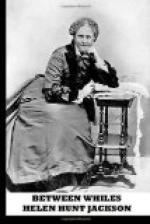It was an odd way that Sandy went to work to win her: his ways had been odd all his life,—so odd that it had long ago been accepted in the minds of the Charlottetown people that he would never find a woman to wed him; only now and then an unusually perspicacious person divined that the reason of his bachelorhood was not at all that women did not wish to wed him, spite of his odd ways, but that he himself found no woman exactly to his taste.
True it was that Sandy Bruce, aged forty, had never yet desired any woman for his wife till he looked into the face of Little Bel in the Wissan Bridge school-house. And equally true was it that before the last strains of “Scots wha ha’ wi’ Wallace bled” had died away on that memorable afternoon of her exhibition of her school, he had determined that his wife she should be.
This was the way he took to win her. No one can deny that it was odd.
There was some talk between him and his temporary colleague on the School Board, old Dalgetty, as they drove home together behind the brisk Norwegian ponies; and the result of this conversation was that the next morning early—in fact, before Little Bel was dressed, so late had she been indulged, for once, in sleeping, after her hard labors in the exhibition the day before—the Norwegian ponies were jingling their bells at John McDonald’s door; and John himself might have been seen, with a seriously puzzled face, listening to words earnestly spoken by Sandy, as he shook off the snow and blanketed the ponies.
As the talk progressed, John glanced up involuntarily at Little Bel’s window. Could it be that he sighed? At any rate, there was no regret in his heart as he shook Sandy’s hand warmly, and said: “Ye’ve my free consent to try; but I doubt she’s not easy won. She’s her head now, an’ her ain way; but she’s a good lass, an’ a sweet one.”
“An’ I need no man to tell me that,” said the dauntless Sandy, as he gave back the hearty hand-grip of his friend; “an’ she’ll never repent it, the longest day o’ her life, if she’ll ha’ me for her man.” And he strode into the house, bearing in his hand the five golden guineas which his friend Dalgetty had, at his request, commissioned him to pay.
“Into her own hand, mind ye, mon,” chuckled Dalgetty, mischievously. “Ye’ll not be leavin’ it wi’ the mither.” To which sly satire Sandy’s only reply was a soft laugh and nod of his head.
As soon as Little Bel crossed the threshold of the room where Sandy Bruce stood waiting for her, she knew the errand on which he had come. It was written in his face. Neither could it be truthfully said to be a surprise to Little Bel; for she had not been woman, had she failed to recognize on the previous day that the rugged Scotchman’s whole nature had gone out toward her in a sudden and overmastering attraction.
Sandy looked at her keenly. “Eh, ye know’t a’ready,” he said,—“the thing I came to say t’ ye.” And he paused, still eying her more like a judge than a lover.




